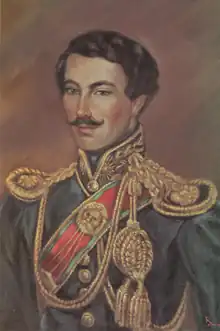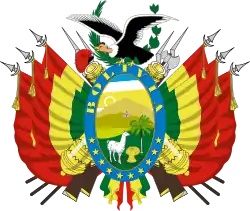José María Pérez de Urdininea | |||||||||||||||||||||||||||||||||||||||||||||||||||||||||||
|---|---|---|---|---|---|---|---|---|---|---|---|---|---|---|---|---|---|---|---|---|---|---|---|---|---|---|---|---|---|---|---|---|---|---|---|---|---|---|---|---|---|---|---|---|---|---|---|---|---|---|---|---|---|---|---|---|---|---|---|
 | |||||||||||||||||||||||||||||||||||||||||||||||||||||||||||
| 3rd President of Bolivia | |||||||||||||||||||||||||||||||||||||||||||||||||||||||||||
| In office 18 April 1828 – 2 August 1828 | |||||||||||||||||||||||||||||||||||||||||||||||||||||||||||
| Preceded by | Antonio José de Sucre | ||||||||||||||||||||||||||||||||||||||||||||||||||||||||||
| Succeeded by | José Miguel de Velasco (acting) | ||||||||||||||||||||||||||||||||||||||||||||||||||||||||||
| |||||||||||||||||||||||||||||||||||||||||||||||||||||||||||
| Personal details | |||||||||||||||||||||||||||||||||||||||||||||||||||||||||||
| Born | José María Pérez de Urdininea 31 October 1784 near Luribay, Viceroyalty of the Río de la Plata (now Bolivia) | ||||||||||||||||||||||||||||||||||||||||||||||||||||||||||
| Died | 4 November 1865 (aged 81) La Paz, Bolivia | ||||||||||||||||||||||||||||||||||||||||||||||||||||||||||
| Spouse | Josefa Terrazas | ||||||||||||||||||||||||||||||||||||||||||||||||||||||||||
| Signature | .svg.png.webp) | ||||||||||||||||||||||||||||||||||||||||||||||||||||||||||
José María Pérez de Urdininea (31 October 1784 – 4 November 1865) was a Bolivian military officer and statesman who served as the third president of Bolivia in 1828. He was the first Bolivian president to be born in Bolivia itself. He fought with the patriots against the Argentines in Peru. Despite being President for only three months, Pérez held a number of important positions in the Bolivian government including Minister of War between 1841 and 1847.
Early life
Youth and the Spanish American Wars of Independence
José María Pérez de Urdininea was born in the Anquioma hacienda, near Luribay on 31 October 1784. He studied at the La Paz seminary before later studying in Cochabamba. He joined the Bolivian War of Independence in 1809, fighting in the Battle of Huaqui, after which he was taken wounded to Argentina where he joined the army of Manuel Belgrano and fought in the Battle of Tucumán and the Battle of Salta during the Argentine War of Independence.[1] He fought from 1811 to 1821 under the command of various other Argentine leaders including José Rondeau, Martín Miguel de Güemes, and José de San Martín.
From 1822 to 1823 he was the Governor of San Juan Province, where he formed an army of 500 men under the command of José María Paz to invade Upper Peru. In early 1825, together with Governor of Salta Juan Antonio Álvarez de Arenales, Pérez received the surrender of the last Spanish royalist chief in the territory of Río de la Plata.[2]
The Bolivian Republic and Presidency
Acting President
Bolivian President Antonio José de Sucre incorporated Pérez into the Bolivian Army, appointing him Minister of War on 9 December 1827 and later President of the Council of Ministers.[3] It was in this capacity that he took command of the government on 18 April 1828 after Sucre was wounded in an army revolt. Accused of not having faced the invasion of Agustín Gamarra, Pérez retired to one of his estates for more than ten years.
The War of the Confederation and death
In 1838, Marshal Andrés de Santa Cruz, then President of Bolivia and Protector of the Peru–Bolivian Confederation, reincorporated him into the army. He participated in the Battle of Yungay which ultimately resulted in the dissolution of the Peru-Bolivian Confederation.[2] He served again as Minister of War during the governments of José Ballivián in 1843 and Jorge Córdova from 1855 to 1857. He died on 4 November 1865.
References
- ↑ "José María Pérez de Urdininea (1784-1865): Fue presidente de Bolivia". Archived from the original on 6 September 2019. Retrieved 3 May 2021.
- 1 2 Gisbert 2003, pp. 568
- ↑ Gisbert 2003, pp. 438–439
Bibliography
- Gisbert, Carlos D. Mesa (2003). Presidentes de Bolivia: entre urnas y fusiles : el poder ejecutivo, los ministros de estado (in Spanish). Editorial Gisbert.


